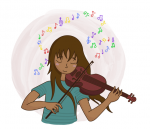If you’ve ever performed in front of a crowd, you know the feeling when you walk onstage and the spotlight is focused entirely on you. The sea of people extends before you, hidden in the darkness, their eyes and ears all trained intently on you. They’re waiting for you to deliver your speech, sing a song, play your instrument – just do something.
At that point, you’re most likely standing there with hands shaking from nervousness and sweat glistening on your brow. Yet the adrenaline pumps you to keep going. That rush is exactly how I feel when I stand on stage and play the violin.
Research shows the patience required for playing a musical instrument is extremely applicable to studying in college. There are various benefits of playing a musical instrument such as having better memory, better analytical skills and higher levels of executive functions. Creative participation in music also improves self-image and self-awareness.
The first time I heard soothing music emerging from a violin, I was transfixed. Ten years have passed since I started learning it, my calloused fingers a testament to my unending will to learn and practice. Playing a musical instrument since a young age with appropriate guidance and regular lessons has not just improved my musical prowess, but has also taught me the importance of discipline and restraint – perfecting a musical piece takes hours of practice and patience.
When I string the bow on the violin, I can shed all inhibitions and become someone who thinks in polychromatic abstract forms, rather than geometric two-dimensionality. Sophia Luo, a first-year linguistics student who plays the tenor saxophone in the UCLA marching band, agrees.
“Being a part of an ensemble quite often puts you in situations you normally wouldn’t find yourself in,” Luo said. “For instance, if jazz musicians ‘session’ with musicians they’ve never met before, they have to be confident and comfortable enough to openly share their musical ideas while being attentive to the subtle interactions that are happening in the group.”
She added, “For me, playing jazz in an improvisation-based context has made me more patient and appreciative of other people’s ideas.”
Playing the violin also helps me unwind and re-energize after a long, hard day, whether at school or otherwise. It proves to be a good break and distracts me. For a short while, I can put all my problems, deadlines and tests at the back of my head and focus on the music pouring out of my hands. Ashley Bowman, a first-year music education student who plays the clarinet and oboe in the UCLA marching band has similar views.
“I haven’t had the easiest life family-wise, and struggled a lot during high school,” Bowman said. “Music has always given me something to look forward to every day and has given me happiness and passion in the darkest times of my life, and for sometime I am able to forget all my problems.”
Julianne Zingmond, a first-year nursing student who plays the flute and bassoon in the UCLA marching band, believes that there exists a piece of music suiting every emotion. Whether one is sad, happy or anxious, playing a particular piece that one associates with a particular emotion has a tendency to act as a natural antidepressant. It helps one through bad experiences and enhances the good ones.
Being a part of a group and playing an instrument also encourages friendships and familial ties to be formed among the people. Although they may play for different causes – from spreading awareness about their folk music and encouraging people to join, to just jamming together for fun – the result is the same. Performing music makes the musicians and the listeners both happy.
There are various on-campus musical organizations that organize events and invite everybody to them for people to enjoy their music and be a part of something different.
Grupo Folklorico and Hanoolim play Mexican and Korean folk and classical music respectively. Similarly, Avartan is a budding nonprofit organization that aims to support and promote youth Indian classical musicians.
“In my experience, my instrument has been my greatest guide to myself,” said Ram Eshwar Kaundinya, leader of Avartan and second-year cognitive science student. “Playing an instrument is an art and art requires a constant re-examining of oneself in order to put forth what you truly are into a single moment of creation. This presence of mind is what defines the most authentic moments in life, and this is what playing an instrument trains you to do.”
Every time I play the violin is a new experience for me. I can be an intrepid explorer of a wonderland of music beyond the monotony of my usual everyday life. It has helped me in several ways, strengthened my will and changed my personality for the better. When I finish my piece, playing the high note that took me ages to perfect, I stand before the applauding audience with a smile on my face and a sense of relief in my tense muscles, believing that it was all worth it.
